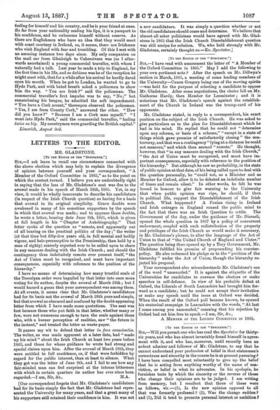LETTERS TO THE EDITOR.
MR. GLADSTONE.
[To raw Exams os TXa "Sesersres."1
6'171,-1 ask leave to recall one circumstance connected with the above election which may help to explain the divergence of Opinion between yourself and your correspondent, "A Member of the Oxford Committee in 1865," as to the point on which the contest turned. I believe you are undoubtedly right in saying that the loss of Mr. Gladstone's seat was due to the avowal made in his speech of March 28th, 1865. Yet, in my view, it would be wholly inaccurate to describe his candidature .(in respect of the Irish Church question) as having for a basis that avowal in its original simplicity. Grave doubts were awakened in many of his sometime supporters by the speech in which that avowal was made ; and to appease those doubts, he wrote a letter, bearing date Syne 8th, 186,5, which is given at fall length in his" Chapter of Autobiography." That letter spoke of the question as "remote, and apparently out of all bearing on the practical politics of the day ;" the writer (at that time but fifty-five years old, in full mental and bodily vigour, and heir-presumptive to the Premiership, then held by a man of eighty) scarcely expected ever to be called upon to share in any measure dealing with the Irish Church ; and should the contingency thus indefinitely remote ever present itself, "the Act of Union must be recognised, and must have important consequences, especially with reference to the position of the hierarchy."
I have no means of determining how many trustful souls of the Trevelyan order were beguiled by that letter into once more voting for its author, despite the avowal of March 28th; but I would hazard a guess that your correspondent was among them. At all events, it seems clear that Mr. Gladstone's candidature had for its basis not the avowal of March 28th pure and simple, but that avowal as obscured and confused by the doubt.appeasing letter from which I have mole some quotations. The seat was lost because those who put faith in that letter, whether many or few, were not numerous enough to turn the scale against those who, with a keener perception of realities, saw "the future in the instant," and treated the letter as waste-paper.
It passes my wit to defend that letter in fore conscientiee. 'The writer, as was made apparent at a later date, had "made up his mind" about the Irish Church at least two years before 1865, and those for whose guidance he wrote had strong and special claims upon him. After the avowal of March 28th, they were entitled to full confidence, or, if that were forbidden by regard for the public interest, than at least to silence. What they got was the letter of June 8th, and I fail to see how any fair-minded man can feel surprised at the intense bitterness with which in certain quarters its author has ever since been
[Our correspondent forgets that Mr. Gladstone's candidature had for its basis simply the fact that Mr. Gladstone had repre- sented the University for many years, and that a great many of his supporters still retained their confidence in him. It was not a new candidature. It was simply a question whether or not the old candidature should cease and determine. We believe that almost all sober politicians would have agreed with Mr. Glad- stone in 1865 that the Irish Church Disestablishment question was still unripe for solution. We, who held strongly with Mr. Gladstone, certainly thought so.—En. Spectator.]


































 Previous page
Previous page